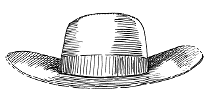Difference between revisions of "Chapter 3"
| Line 16: | Line 16: | ||
:"[the Virgin] was above the law; she took feminine pleasure in turning Hell into an ornament" <ref>Adams, Henry, ''Mont Saint Michel and Chartres and The Education'', The Library of America, 1983, p.596</ref> | :"[the Virgin] was above the law; she took feminine pleasure in turning Hell into an ornament" <ref>Adams, Henry, ''Mont Saint Michel and Chartres and The Education'', The Library of America, 1983, p.596</ref> | ||
| + | |||
| + | <div id="virtue">a: 78; b: 78 -- '''under the influence either of Fortune, or of virtue'''<br /> | ||
| + | |||
| + | From Pynchon's short story ''Entropy'': | ||
| + | :His had always been a vigorous, Italian sort of pessimism: like Machiavelli, he allowed the forces of virtù and fortuna to be about 50/50; but the equations now introduced a random factor which pushed the odds to some unutterable and indeterminate ratio which he found himself afraid to calculate. <ref>Pynchon, Thomas, ''Slow Learner'', Jonathan Cape, 1985, pp.87-88</ref> | ||
a: 85; b: 86 - '''Girgis the mountebank'''<br /> | a: 85; b: 86 - '''Girgis the mountebank'''<br /> | ||
Revision as of 08:36, 13 May 2007
- Please keep these annotations SPOILER-FREE by not revealing information from later pages in the novel.
It is clearer in Pynchon's short story Under The Rose (which he repurposed for V.) why Porpentine is murdered "under the duello". He had violated "a tradition in espionage where everything was tacitly on a gentlemanly basis" [1]:
- "'You screamed at the Chief,' Bongo-Shaftsbury announced. 'You said: Go away and die.'" [2]
Likely a reference Karl Richard Lepsius (1810-84), German Egyptologist and the author of numerous books including Chronologie der Aegypter (which laid the foundation for a scientific treatment of early Egyptian history) and Todtenbuch (the Egyptian Book of the Dead) (1867); Lepsius was involved with the study of ancient Egyptian blue glass and its possible material sources, particularly the turquoise blue and greenish-blue of some Egyptian glass.[3] Wikipedia entry
From Henry Adams' "Les Miracles de Notre Dame" in Mont Saint Michel and Chartres:
- "[the Virgin] was above the law; she took feminine pleasure in turning Hell into an ornament" [4]
From Pynchon's short story Entropy:
- His had always been a vigorous, Italian sort of pessimism: like Machiavelli, he allowed the forces of virtù and fortuna to be about 50/50; but the equations now introduced a random factor which pushed the odds to some unutterable and indeterminate ratio which he found himself afraid to calculate. [5]
a: 85; b: 86 - Girgis the mountebank
A mountebank is person who sells quack medicines from a platform, a boastful unscrupulous pretender, or charlatan.
References
- ↑ Pynchon, Thomas, Slow Learner, Jonathan Cape, 1985, p.102
- ↑ Ibid., p.136
- ↑ Lucas, Alfred, Ancient Egyptian Materials and Industries, 1926
- ↑ Adams, Henry, Mont Saint Michel and Chartres and The Education, The Library of America, 1983, p.596
- ↑ Pynchon, Thomas, Slow Learner, Jonathan Cape, 1985, pp.87-88
| Chapter 1 In which Benny Profane, a schlemihl and human yo-yo, gets to an apocheir 9/1 |
Chapter 2 The Whole Sick Crew 44/39 |
Chapter 3 In which Stencil, a quick-change artist, does eight impersonations 61/59 |
Chapter 4 In which Esther gets a nose job 95/97 |
|---|---|---|---|
| Chapter 5 In which Stencil nearly goes West with an alligator 111/115 |
Chapter 6 In which Profane returns to street level 134/141 |
Chapter 7 She hangs on the western wall 152/161 |
Chapter 8 In which Rachel gets her yo-yo back, Roony sings a song, and Stencil calls on Bloody Chiclitz 213/229 |
| Chapter 9 Mondaugen's story 229/247 |
Chapter 10 In which various sets of young people get together 280/305 |
Chapter 11 Confessions of Fausto Maijstral 304/333 |
Chapter 12 In which things are not so amusing 347/385 |
| Chapter 13 In which the yo-yo string is revealed as a state of mind 367/407 |
Chapter 14 V. in love 393/437 |
Chapter 15 Sahha 415/461 |
Chapter 16 Valletta 424/471 |
| Epilogue, 1919 456/507 |
